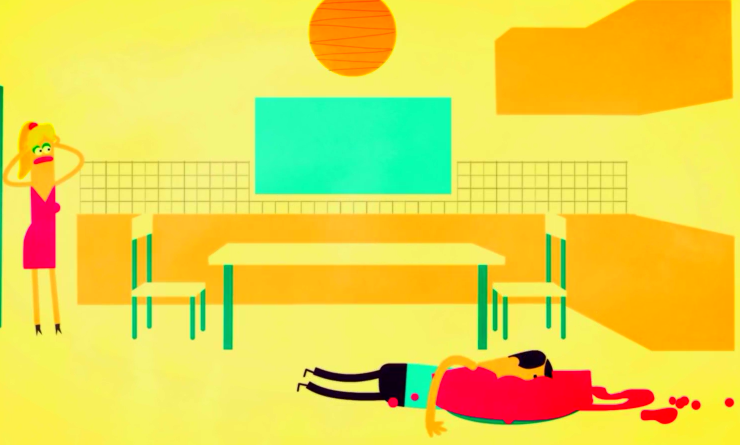(单词翻译:单击)
Picture this: your friend and you are watching a sitcom and a sassy sidekick walks into a room, carrying a four-tiered wedding cake.
想象一下:你和朋友正在看一出情境喜剧,剧中一位时髦帅气的配角走了进来,手捧着一个四层的婚礼蛋糕。
He trips, falls, and face-plants into the cake.
他滑了一跤,跌倒了,还一头栽进蛋糕里。
Your friend doubles over with laughter and says, "It's so ridiculous! So ironic!"
你的朋友笑弯了腰说道:这实在太可笑了!多讽刺啊!
Well, quick, what do you do?
好了,这时候你会做什么呢?
Do you laugh along with the laugh track and let this grievous misinterpretation of irony go?
你会就这样忽略这个严重对“讽刺”的误解,然后跟着你的朋友大笑吗?
Or, do you throw caution to the wind and explain the true meaning of irony?
还是,你会先把礼数放一边,然后好好解释“讽刺”真正的含义呢?
If you're me, you choose the latter.
如果你是我,你就会选择后者。
Unfortunately, irony has been completely misunderstood.
很不幸的,“讽刺”一直被完全误解了。
We tend to throw out that term whenever we see something funny or coincidental.
我们往往把它随意地用在任何我们认为好笑或是凑巧的情况。
And while many examples of true irony can be funny, that is not the driving factor of being ironic.
虽然很多讽刺的例子是好笑的,但这并非是讽刺之所以为讽刺的关键。
A situation is only ironic if what happens is the exact opposite of what was expected.
唯有在发生的事和预料的完全相反的情况才叫“讽刺”。
If you expect A, but get B, then you have irony.
如果你预期的是A却得到B,那就是“讽刺”了。
Let's take the slap-stick cake situation as an example.
再回头看看刚刚的蛋糕例子吧。
When someone walks in precariously balancing something that shouldn't be carried alone,
当有个人摇摇晃晃的扛着一个他不该独自拿的东西,
trips, falls, and makes a mess, it is funny, but it's not ironic.
滑了一跤,跌得一塌糊涂,这好笑但不讽刺。
In fact, you probably expect someone who is single-handedly carrying a huge cake to trip.
事实上,你大概预料得到一个单手拿着一个大蛋糕的人会跌倒。

When he does, reality aligns with expectations, and so that is not irony.
当他真的跌倒了,预料和现实相符,所以这不是“讽刺”。
But what if the sassy sidekick walked in wearing a gold medal
但要是这个人走进来的时候,
that he'd won at the cake walking event at the Atlanta Olympics in 1996?
戴着他在1996年亚特兰大奥运扛蛋糕比赛赢的金牌呢?
What if that sidekick was a professional cake carrier?
又或者他是一位专业的蛋糕送货员呢?
Then, maybe there would have been a reasonable expectation
如果这样,我们就会合理的预计,
that he would have been more skilled when carrying a ridiculously large cake.
当他扛着一个大到荒唐的巨型蛋糕时会更加游刃有余。
Then, when that reasonable expectation was not met by the tripping sidekick, irony would have been exemplified.
那么,当这个预期没有成真的时候,“讽刺”就出现了。
Another example. A senior citizen texting and blogging.
再举一个例子。一位老年人发短信和写博客。
The common and reasonable expectation of more mature men and women is that they don't like or know technology,
一般我们会预期,比较'成熟'的人们不喜欢或不了解科技。
that they have a hard time turning on a computer, or that they have the old brick cell phones from the 1980s.
他们在打开计算机时会遇到困难,或是还在用上世纪80年代的旧砖手机。
One should not expect them to be connected, high-tech, or savvy enough to text or to be blogging,
我们不会指望他们会如此信息化,高科技化,或是厉害到能发短信、写博客,
which must seem like some sort of newfangled thing that "back in my day," they never had.
因为这些玩意对他们来说一定会太新奇,也不会出现在他们的“想当年...”老调子中。
So when Granny pulls out her smart phone to post pictures of her dentures or her grandkids, irony ensues.
因此,当老奶奶拿出智能手机发布她的假牙或是孙子的照片时,“讽刺”就出现了。
Reasonable expectations of the situation are not met. That is irony.
合理的期待和当下情况不符,这就是“讽刺”。
So while the cake dropper might not be ironic, there are all kinds of situations in life that are.
因此,虽然那个扔掉蛋糕的家伙并不讽刺,不过生活中还是有各式各样十分“讽刺”的情况。
Go out, and find those true examples of irony.
所以,起身去发现这些真正的“讽刺”吧!


